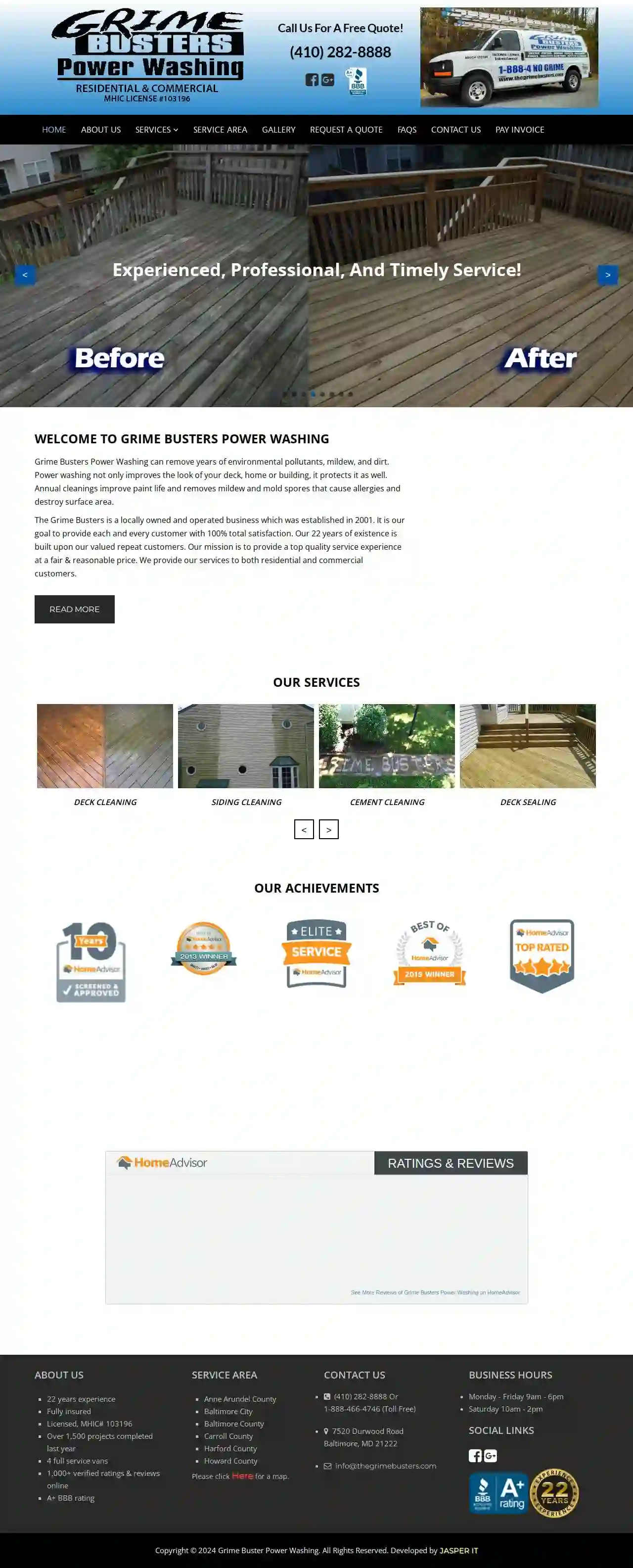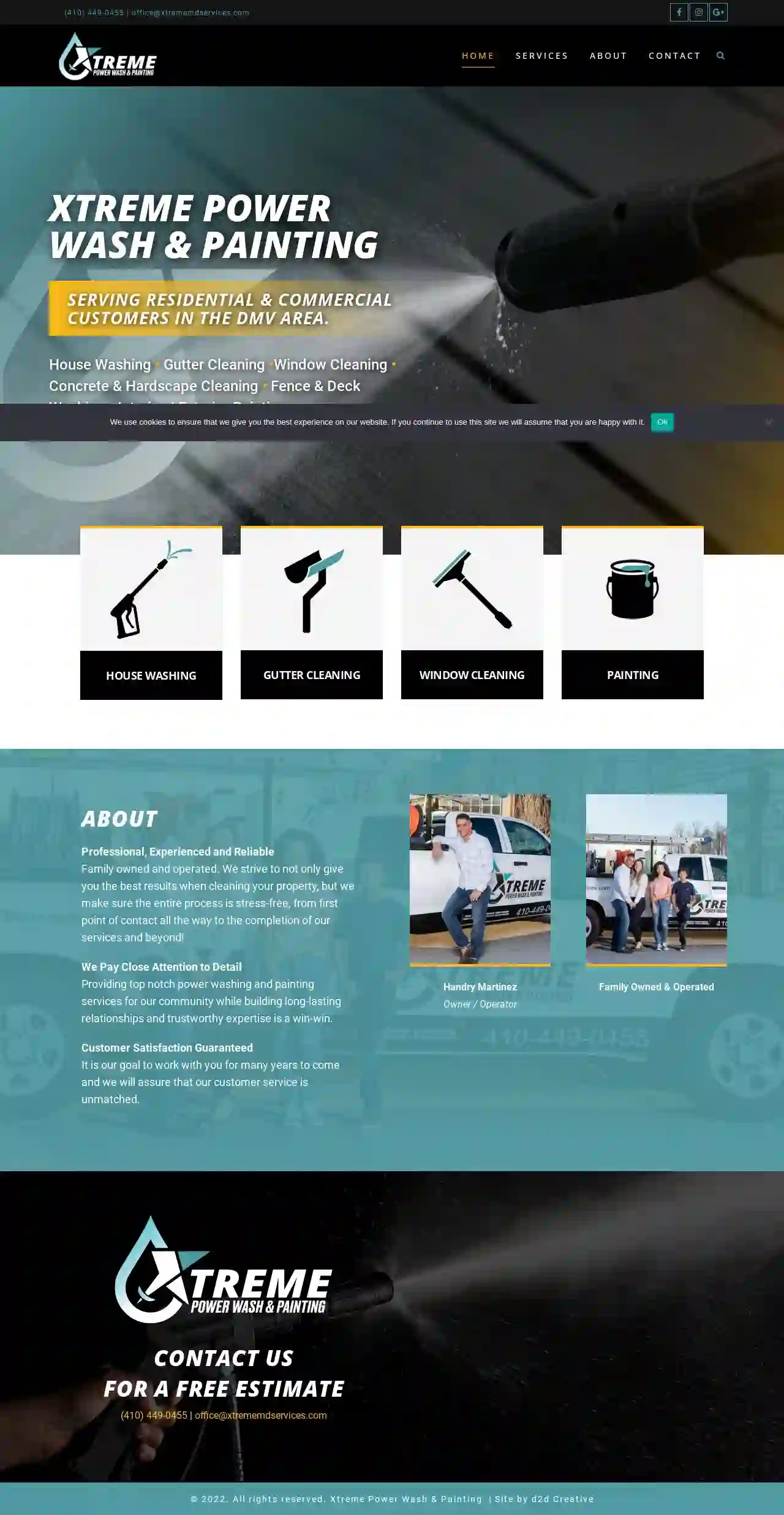Pressure Washing Glenn Dale
Best Deck and Fence Cleaning in Glenn Dale
Get up to 3 Pressure Washing quotes for your project today! Compare profiles, reviews, accreditations, portfolio, etc... and choose the best offer.

Haynes Unlimited Power Washing, LLC
5125 reviewsUpper Marlboro, MD, 11109 Canter Circle, 20772, USHaynes Unlimited Power Washing, LLC is a trusted source for residential and commercial pressure washing services in Upper Marlboro and surrounding areas. With over 10 years of experience, our team specializes in rejuvenating the exteriors of homes and businesses, ensuring they shine with renewed freshness and curb appeal. We use state-of-the-art equipment and environmentally-friendly solutions to effectively remove dirt, grime, mold, and stains from a variety of surfaces.
- Services
- Why Us?
- Accreditations
- Our Team
- Testimonials
- Gallery
Get Quote
Baltimore Pressure Washers
5134 reviews614 Kalorama rd., Sykesville, 21784, USBaltimore Pressure Washers is your one-stop shop for all your pressure washing needs. We offer a wide range of services for both residential and commercial clients, including house washing, roof cleaning, window cleaning, gutter cleaning, driveway cleaning, fence cleaning, deck and patio cleaning, pool deck cleaning, rust removal, solar panel cleaning, and Christmas light installation. We also offer a variety of commercial services, such as building washing, storefront cleaning, drive-through cleaning, parking lot and garage cleaning, apartment complex power washing, graffiti removal, dumpster pad cleaning, gum removal, awning cleaning, gas station cleaning, car wash cleaning, post-construction clean up, industrial power washing, and HOA power washing. We are a fully insured and licensed company with over 10 years of experience in the pressure washing industry. Our team of highly trained and experienced professionals is dedicated to providing our clients with the highest quality service possible. We use only the latest and greatest equipment and techniques to ensure that your property is cleaned to perfection. We are proud to serve the Baltimore area and surrounding communities. Contact us today for a free estimate!
- Services
- Why Us?
- Gallery
Get Quote
Sure Shot Pressure Washing
519 reviewsP.O. Box 2022, Bowie, Maryland, 20718, USSure Shot Pressure Washing is a top-rated pressure washing company serving Maryland, Washington D.C., and Virginia. With over 25 years of experience, they offer a full range of residential and commercial pressure washing services. Their team is dedicated to providing excellent customer service and delivering exceptional results. They specialize in cleaning and restoring a variety of surfaces, including pool decks, awnings, stone/brick patios, driveways, concrete floors, fences, rooftops, and home siding. Sure Shot Pressure Washing is committed to exceeding customer expectations and maintaining a reputation for quality and reliability.
- Services
- Why Us?
- Our Team
- Testimonials
- Gallery
Get Quote
Grime Busters Power Washing
5437 reviews7520 Durwood Road, Baltimore, 21222, USGrime Busters Power Washing is a locally owned and operated business established in 2001. We are dedicated to providing 100% customer satisfaction by offering top-quality service at a fair price. Our 22 years of experience have built a strong foundation of repeat customers who trust us for their power washing needs. We serve both residential and commercial clients throughout the Baltimore area. Our team is fully insured, licensed by the Maryland Home Improvement Commission (MHIC# 103196), and carries workers' compensation and liability insurance. We are committed to providing a professional, neat, and thorough job, ensuring your complete peace of mind. We understand the importance of convenience, so we offer flexible scheduling and can even complete the job while you're away. We leave a detailed invoice indicating the completion of the work. At Grime Busters Power Washing, we strive to make your experience enjoyable and hassle-free. Contact us today to discuss your power washing needs and let us help you restore the beauty of your property.
- Services
- Why Us?
- Accreditations
- Gallery
Get Quote
J & M Power Washer LLC
51 reviewsBaltimore, USExperts in Pressure Washing catering to Maryland, Pensilvania and its surrounding areas. Elevate your property’s curb appeal with the premier Pressure Washing Specialists serving Maryland, Pensilvania, and the surrounding areas. Our expert team is dedicated to revitalizing surfaces and restoring the pristine beauty of your space. Experience the transformative power of our pressure washing services, where cleanliness meets exceptional expertise. Trust us to bring a renewed vibrancy to your property’s exterior, making a lasting impression in Maryland, Pennsylvania, and its neighboring areas. Your satisfaction is our priority as we redefine the standard for pressure washing excellence. Choose the specialists who understand the unique needs of your property – choose Pressure Washing Specialists. What sets J & M Power Washer LLC apart as your ideal choice for addressing your cleaning needs? Dive into the dynamic world of power washing with J & M Power Washer LLC. Our cleaning services are versatile and customized to cater to each client’s unique needs. Explore the option of weekly, bi-weekly, monthly, or one-time power washing services tailored to breathe new life into your home or business. Renowned for our expertise in cleaning homes with pets, we invite you to experience the transformative impact of our professional power-washing solutions. Don’t wait any longer – give us a call and witness the revitalization of your space. ASSURED CONTENTMENT At J & M Power Washer LLC, our team comprises extensively trained professionals employing top-tier cleaning products. In the unlikely event of dissatisfaction with a cleaned area, we are dedicated to revisiting it and ensuring it meets your expectations to the fullest. WE TREAT YOUR HOME WITH THE SAME LEVEL OF CARE AS WE WOULD OUR OWN Experience complete peace of mind with J & M Power Washer LLC, as we are fully bonded and insured. Enter your home with confidence, knowing that your property is safeguarded and entrusted to reliable hands. WE UPHOLD OUR PROMISES J & M Power Washer LLC‘ experts consistently adhere to the scheduled arrival window. Should any adjustments be necessary, we promptly communicate with our clients, facilitating any needed changes to the appointment. Your convenience is our top priority.
- Services
- Why Us?
- Gallery
Get Quote
JR Superwash
578 reviews1000 Main Street, Suite 100, Columbia, 29201, USJR Superwash Inc. is a professional pressure washing and exterior cleaning company serving the Columbia, SC area. Our research and experience over the years provide us with the best tools to save any property from the treacherous affects of dirt, mold, algae, etc. We specialize in soft washing, a highly safe and professional method that drastically reduces the chances of damage to your property. We use a proprietary algicide that will rid your home of dirt, mold, and mildew. Pressure washing your home is an extremely advantageous decision. It boosts your curb appeal and property value, whether it's brick siding, vinyl siding, stucco siding, or anything else. We have the tools to clean it! You won't have to change your schedule or inconveniently disturb your routine. As long as we have water, we can clean it!
- Services
- Why Us?
- Our Team
- Testimonials
- Gallery
Get Quote
Absolute Power Washing LLC
519 reviewsRockville, 20850, USABSOLUTE POWER WASHING LLC in Rockville, the expert power washing company. We offer a variety of services including pressure washing, power washing, soft wash, deck repair, maintenance and staining. CLICK HERE FOR FREE ESTIMATES We are a local family owned and operated company located in Rockville, MD. We take our time and strive for perfection on every job. We have more than 10 years of experience in the industry and are knowledgeable on some of the best methods and techniques to use when pressure washing, like using a soft wash method, roof cleaning, and specific cleaning solutions to use on each surface. When you choose us you can be confident that we will perform each job with care. Customer Satisfaction Guaranteed. We are only done with the job when YOU are satisfied. Our number one goal is to WOW you with the results. Absolute Power Washing guarantees your satisfaction! We service Montgomery County, MD (Rockville, Bethesda, Potomac, Gaithersburg, Silver Spring) and surrounding counties too, just ask!
- Services
- Why Us?
- Testimonials
- Gallery
Get Quote
Xtreme Power Wash & Painting
536 reviews123 Main St, Suite 100, Baltimore, 21000, USXtreme Power Wash & Painting is a family-owned and operated business that provides top-notch power washing and painting services to residential and commercial customers in the DMV area. They strive to offer stress-free services, focusing on detail and customer satisfaction. Their services include low-pressure house washing, gutter cleaning and brightening, pure water window cleaning, concrete and hardscape cleaning, fence and deck washing, and interior and exterior painting.
- Services
- Why Us?
- Our Team
- Gallery
Get Quote
Eco Bright Exteriors
5105 reviewsFrederick, MD, 6502 Montalto Xing Unit M, 21703, USAt Eco Bright Exteriors, we provide only the best power washing and exterior cleaning services in the Frederick, MD area. Our team of professionals is dedicated to getting your home's exterior looking its best from top to bottom. We offer a range of services, including pressure washing, soft washing, house washing, sidewalk cleaning, driveway cleaning, roof cleaning, solar panel cleaning, heavy equipment cleaning, awning cleaning, and exterior window cleaning. With our gentle cleaning approaches, you can enjoy clean and pristine exterior surfaces without worrying about damage or deterioration. Contact us today to schedule your free estimate and let us help you achieve the beautiful and stunning results you deserve.
- Services
- Why Us?
- Accreditations
- Our Team
- Testimonials
- Gallery
Get Quote
MEGAH SoftWash of Baltimore
511 reviews123 Main St, Baltimore, MD, 21201, USMEGAH SoftWash is a soft washing, low-pressure washing and exterior cleaning company based in Baltimore, MD. They offer a range of services including house washing, driveway cleaning, walkways, siding, windows, gutters, roof cleaning, and more. The company prides itself on being the highest rated and reviewed exterior cleaning company in Baltimore, offering fast and easy scheduling, and providing customers with three different packages to choose from.
- Services
- Why Us?
- Accreditations
- Our Team
- Testimonials
- Gallery
Get Quote
Over 60,241+ Cleaning Businesses onboarded
Our janitorial contractors operate in Glenn Dale & beyond!
CleaningMatch has curated and vetted the Best Janitorial Services in and around Glenn Dale. Find the most reliable contractor today.
Frequently Asked Questions About Pressure Washing
- Online Reviews: Check online reviews on platforms like Google, Yelp, and Facebook to gauge customer satisfaction and service quality.
- Experience and Expertise: Look for companies with a proven track record and experience in pressure washing various surfaces.
- Licensing and Insurance: Ensure the company is licensed and insured to protect you from liability in case of accidents or damage.
- Equipment and Techniques: Inquire about the company's equipment and techniques to ensure they use appropriate pressure levels and cleaning solutions for different surfaces.
- Quotes and Pricing: Obtain detailed quotes from multiple pressure washing companies and compare their pricing. Make sure the quotes are transparent, outlining all services and costs.
- Professionalism and Communication: Choose a company that is responsive, provides clear communication, and demonstrates professionalism in its interactions.
- Size of the Area: Larger areas generally cost more to pressure wash than smaller ones.
- Type of Surface: Different surfaces require different pressure levels and cleaning solutions, which can affect pricing.
- Condition of the Surface: Heavily soiled or stained surfaces may require more time and effort to clean, impacting cost.
- Accessibility: Difficult-to-reach areas may require specialized equipment and increase costs.
- Additional Services: Services like pre-treating stains, applying protective coatings, or mold removal may incur additional charges.
- Hard Surfaces: Pressure washing is often successful in removing graffiti from hard surfaces like brick, concrete, or metal.
- Delicate Surfaces: For delicate surfaces like wood or painted surfaces, a gentler approach using specialized graffiti removal products and techniques may be necessary.
- Professional Graffiti Removal: For stubborn or extensive graffiti, consider hiring a professional graffiti removal service. They have specialized equipment, cleaning solutions, and experience in dealing with various types of graffiti.
- Spring and Fall: Spring and fall are often ideal for pressure washing as the temperatures are moderate and the weather is typically dry.
- Summer: Pressure washing can be done in the summer, but avoid doing so during the hottest part of the day to prevent the cleaning solutions from drying too quickly and leaving streaks.
- Winter: Pressure washing is possible in the winter, but be mindful of freezing temperatures that can affect cleaning solutions and cause slippery surfaces.
How do I find a good pressure washing service?
Utilize online directories like CleaningMatch to find and compare qualified pressure washing services in your area.
How much does pressure washing cost?
To get accurate pricing, request quotes from multiple pressure washing companies. Provide details about the size and type of surface, its condition, and any additional services you require.
Can pressure washing remove graffiti?
If you're attempting DIY graffiti removal, always test the cleaning solution and pressure washing technique on an inconspicuous area first to avoid damaging the surface.
What is the best time of year for pressure washing?
Choose a day with mild temperatures and dry weather for optimal pressure washing results. Avoid pressure washing in extreme heat, freezing temperatures, or rainy conditions.
How do I find a good pressure washing service?
- Online Reviews: Check online reviews on platforms like Google, Yelp, and Facebook to gauge customer satisfaction and service quality.
- Experience and Expertise: Look for companies with a proven track record and experience in pressure washing various surfaces.
- Licensing and Insurance: Ensure the company is licensed and insured to protect you from liability in case of accidents or damage.
- Equipment and Techniques: Inquire about the company's equipment and techniques to ensure they use appropriate pressure levels and cleaning solutions for different surfaces.
- Quotes and Pricing: Obtain detailed quotes from multiple pressure washing companies and compare their pricing. Make sure the quotes are transparent, outlining all services and costs.
- Professionalism and Communication: Choose a company that is responsive, provides clear communication, and demonstrates professionalism in its interactions.
Utilize online directories like CleaningMatch to find and compare qualified pressure washing services in your area.
How much does pressure washing cost?
- Size of the Area: Larger areas generally cost more to pressure wash than smaller ones.
- Type of Surface: Different surfaces require different pressure levels and cleaning solutions, which can affect pricing.
- Condition of the Surface: Heavily soiled or stained surfaces may require more time and effort to clean, impacting cost.
- Accessibility: Difficult-to-reach areas may require specialized equipment and increase costs.
- Additional Services: Services like pre-treating stains, applying protective coatings, or mold removal may incur additional charges.
To get accurate pricing, request quotes from multiple pressure washing companies. Provide details about the size and type of surface, its condition, and any additional services you require.
Can pressure washing remove graffiti?
- Hard Surfaces: Pressure washing is often successful in removing graffiti from hard surfaces like brick, concrete, or metal.
- Delicate Surfaces: For delicate surfaces like wood or painted surfaces, a gentler approach using specialized graffiti removal products and techniques may be necessary.
- Professional Graffiti Removal: For stubborn or extensive graffiti, consider hiring a professional graffiti removal service. They have specialized equipment, cleaning solutions, and experience in dealing with various types of graffiti.
If you're attempting DIY graffiti removal, always test the cleaning solution and pressure washing technique on an inconspicuous area first to avoid damaging the surface.
What is the best time of year for pressure washing?
- Spring and Fall: Spring and fall are often ideal for pressure washing as the temperatures are moderate and the weather is typically dry.
- Summer: Pressure washing can be done in the summer, but avoid doing so during the hottest part of the day to prevent the cleaning solutions from drying too quickly and leaving streaks.
- Winter: Pressure washing is possible in the winter, but be mindful of freezing temperatures that can affect cleaning solutions and cause slippery surfaces.
Choose a day with mild temperatures and dry weather for optimal pressure washing results. Avoid pressure washing in extreme heat, freezing temperatures, or rainy conditions.